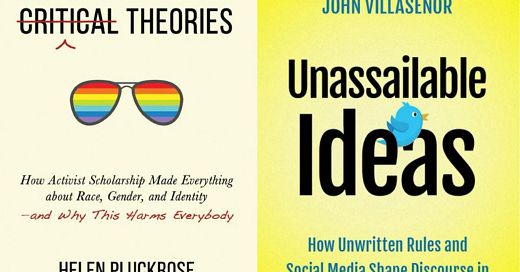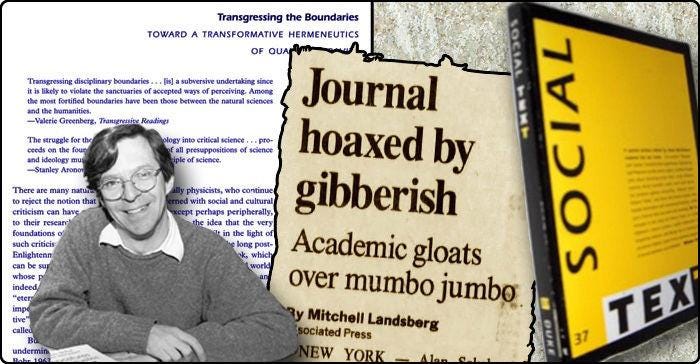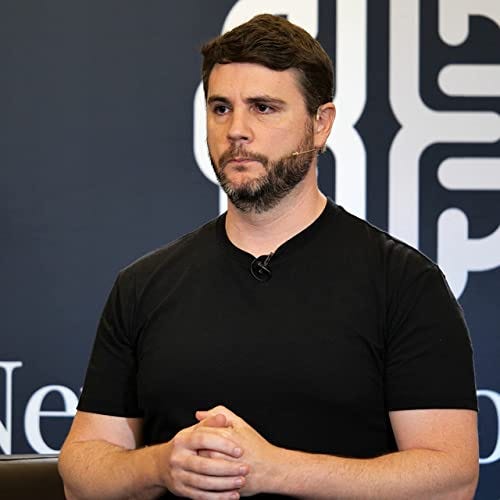Efforts to expose the fake epistemology which has consumed modern social science, and spilled into and polluted most of our institutions, go back decades. Alan Sokal published his “Transgressing the Boundaries: Towards a Transformative Hermeneutics of Quantum Gravity”“ in 1994.
The Reformers - Part 1
This is a 2-part series (hopefully in time I will find more examples… Roland Fryer comes to mind, as does Jordan Peterson). Part 1 is about Alan Sokal, and his brilliant and hilarious “Transgressing the Boundaries: Towards a Transformative Hermeneutics of Quantum Gravity” (1994). Part 2 covers the efforts of James Lindsay and Helen Pluckrose and Peter Boghossian and their ‘Grievance Studies’ hoaxes. Like many of the most profound and incisive events in our culture these ideology-crippling confrontations have been almost entirely ignored, minimized, and dismissed by the mainstream. That’s why they should be shared and discussed as much as possible!
More than 20 years later, James Lindsay, Helen Pluckrose, and Peter Boghossian added their kindling to the sputtering fire. Godspeed, my friends.
Fake epistemologies are so insidious because they duplicate the forms and processes of the real thing (which is scientific knowledge). They make claims to objectivity and rigor which are not borne out. To suppress their dissenters and plaster over the cracks in their edifice they often try to ruin critics, dominate administrations, and falsify data. These strategies are particularly effective in academia, which is bureaucratic and conformist, and where one severed relationship or public misstep can permanently ruin a nascent career. Keep that in mind as you read about the three crusaders for truth involved in the Grievance Studies Affair
We are permanently uncertain about reality. There is simply too much information, too many unknowns (and even unknown unknowns), too much bias and corruption and motivated reasoning. In such circumstances the processes we use to gather data and form conclusions (and the heuristics which result) are of paramount importance. There are, broadly speaking, 3 ways to proceed:
Openly abandon reason and logic altogether (pure faith)
Follow the evidence wherever it might lead. This involves correcting for biases, building in mechanisms for review (blinding, peer review, citations, meta-analyses) and rigorously examining the beginning assumptions (axioms) (science)
Begin with unquestionable axioms or motivations and use evidence and logic selectively and instrumentally. This demands some doublethink but the human brain is actually quite adept at it. In fact, it’s our normal operating system (religion)
As an example, social scientists can either examine all of the data and try to exactly define what systemic racism is, its true character, and whether and to what extent it exists or not, OR they can assume that systemic racism is a huge factor and begin to gather data and create meaning based upon that assumption. Unfortunately the vast majority of sociology has proceeded along the latter track (Option 3, above) for many decades now.
This kind of epistemological system slowly becomes more pharisaic and intricate and putrid and unhinged as time passes. The real issue is that the means of finding coherence are not self-correcting. They cannot refer to the whole of reality as a check on their excesses and distortions and so their conclusions become more fantastic and puritanical as the process proceeds. If you’re using Option 3 to answer the question about systemic racism you will eventually be lead to the conclusion that systemic racism is everywhere and everything, and any effort to characterize it precisely or formulate methods to address it (which would entail admitting that it can be addressed, and eliminated) will become anathema. Trying to discover the mechanisms behind the operation of systemic racism or its generating factors would lead in an uncomfortable direction: some organizations might be found to be free of it and the starting assumption (that it is a huge factor) could be called into question. The people using Option 3 epistemological processes would rather spin their wheels and produce masturbatory nonsense for 50 years than face the possibility that their axioms are falsifiable, and so you end up with a huge and byzantine stack of self-reinforcing nonsense. Citations lend credibility and so papers can endlessly cite one another to add authority to their enterprise (citation hacking), but the entire exercise may in fact be hollow. How could one expose such a shell game? Perhaps the process could be infiltrated and the ridiculousness of the structure could be highlighted with deliberately absurd and offensively unscientific work being incorporated into it. Surely this would indicate to those outside observers that something might be wrong with the associated peer review and hypothesizing processes, along with other procedures?
This brings us to our team of reformers, rare and brilliant and courageous thinkers who were willing the risk their careers and reputations in the search for truth. Their idea was that if you want to address racism (to use my example) you must understand it and have metrics for it. In short, social science must be scientific… otherwise it’s simply a vast and silly machine to produce academic jobs and grants and papers and research, all resting atop a distant fantasy.
Our cast:
James Lindsay - an academic mathematician who now runs the New Discourses content production network, dedicated to exposing and fighting Critical Theory in academic and politics and culture.
Helen Pluckrose - a graduate-level English academic and researcher who has spent years speaking and organizing for liberal values and academic rigor, and who was the editor of Aero Magazine for several years.
Peter Boghossian - a philosopher and former assistant professor of Philosophy at Portland State University, before spurious complaints and harassing administrative investigations forced him out of academia. Now he writes and travels the world, conducting ‘street epistemology’ displays, which help observers and participants learn how to think and communicate and question their own biases.
All of these individuals (especially Boghossian) have experienced an immense amount of stress and stigma due to their work. Keep that in mind as we proceed. Real scientists do not try to ruin one another based upon their ideas or dissents. Real scientists counter what they believe to be false or weak ideas with better research and stronger arguments. Religious enforcers, on the other hand, use crowd sanction and administrative harassment and reputation assassination to remove obstacles and bury their opponents. As with most things, deeds matter greatly. The verity of an epistemology can be seen reflected in the behavior of its adherents. If honesty and openness and truth is being sought the methods tend toward debate and open review. When was the last time a Critical Race Theorist debated a critic? When a belief system tries to use power and numbers and bureaucratic machinations to overwhelm their opponents and bury them they are, in effect, admitting that reality is NOT on their side. The admission (even if its subconscious) creates a high degree of psychic stress and cognitive dissonance in the believers and they become even more venomous and dangerous as their lie is reflected back to them through the hypocrisy of their words and actions. These kinds of censorious activities require a large mass of supporters and the silence and cowardice of the doubters. Whatever else you might say about the reformers, they are not cowards. For that reason alone they deserve attention…
The Reformers - Part 3; The Grievance Studies Affair
(coming soon)









Outstanding
Very informative and well worth the time spent.